
How Do Hospital Beds Help Treat Alzheimer's?
2024-11-08 15:30
Alzheimer's, a name that makes people shudder, not only means the gradual loss of memory, but also indicates a long and difficult journey of care. For Alzheimer's patients and their families, every aspect of daily life will be affected. How to provide the best care for patients is a lingering burden on every caregiver's mind.
In this context, hospital beds have gradually become an important tool for home care, not only playing a key role in improving patient comfort, but also making an indispensable contribution to reducing care pressure. Next, let's explore how hospital beds can help treat and manage Alzheimer's.
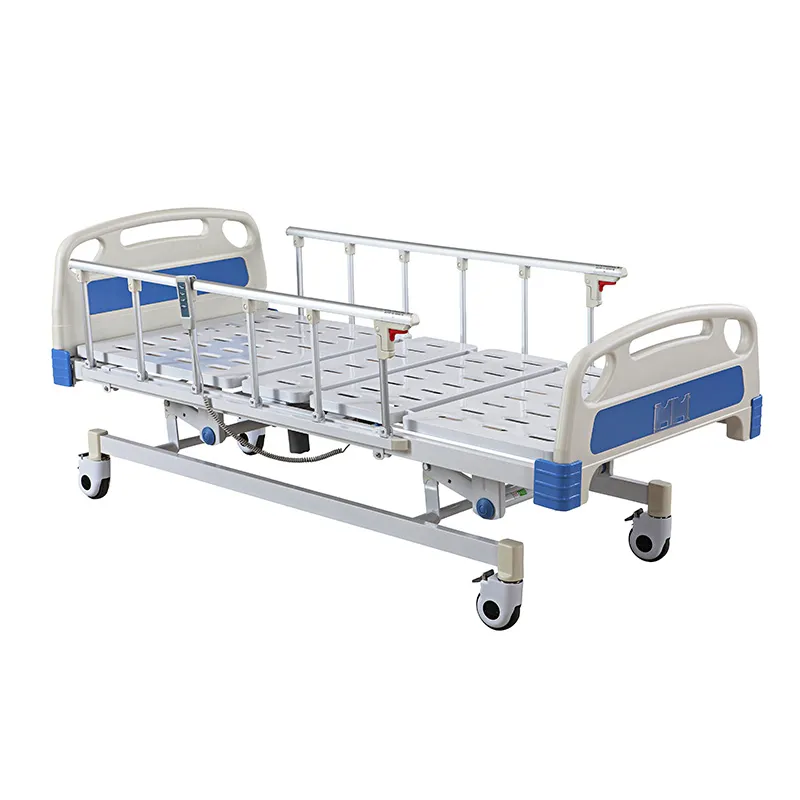
What is Alzheimer's?
Alzheimer's is a progressive neurodegenerative disease that mainly affects the brain's memory, thinking and behavioral functions. It is the most common form of dementia, accounting for about 60-80% of dementia cases. The disease usually occurs in the elderly over 65 years old, but there are also some early-onset cases, which may occur between the ages of 40 and 50.
The cause of Alzheimer's disease is not fully understood, but it is known to be related to the deposition of abnormal proteins in the brain. These proteins form plaques and tangles that disrupt communication between nerve cells and eventually lead to the death of nerve cells. Over time, the patient's brain tissue gradually shrinks, leading to various cognitive and functional impairments.
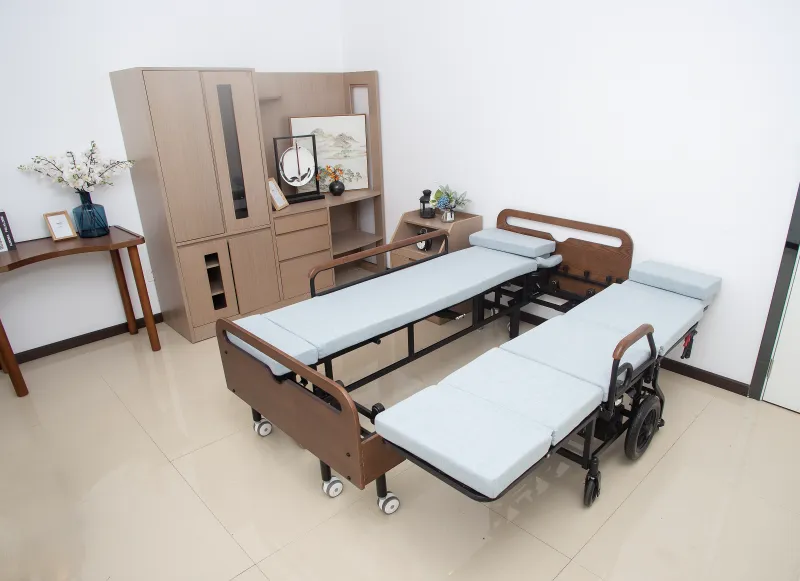
What are the common symptoms of Alzheimer's disease?
Symptoms of Alzheimer's disease usually manifest as mild memory problems in the early stages, such as forgetting what just happened or difficulty recalling familiar names and places. As the disease progresses, symptoms gradually worsen and expand to other cognitive functions and behavioral manifestations. Here are some common symptoms of Alzheimer's disease:
Memory loss
This is one of the most obvious symptoms of Alzheimer's disease. Patients may forget recent events, ask the same questions repeatedly, and even forget important dates and appointments. Memory loss gradually affects short-term memory and long-term memory.
Decreased thinking and reasoning ability
Patients may have difficulty understanding abstract concepts, solving problems, or making decisions. For example, they may have difficulty managing finances, have difficulty making complex plans, and even become disoriented.
Impaired Language
People with Alzheimer's often have trouble finding the right words to express themselves and may repeat the same sentences or use the wrong vocabulary. This language impairment becomes more pronounced in the later stages of the disease, making it impossible for patients to communicate normally.
Loss of Spatial Perception and Orientation
Patients may become lost in familiar places or even be unable to find their way home. They may also have difficulty judging distances or understanding visual-spatial relationships, which increases their risk of falling.
Changes in Mood and Behavior
Alzheimer's not only affects cognitive function, but can also cause significant changes in mood and behavior. Patients may show anxiety, depression, irritability, or aggression, and may even experience hallucinations or delusions.
Difficulty with Daily Activities
As the disease progresses, patients may have difficulty completing daily activities such as dressing, washing, and eating. This loss of function can gradually affect their ability to live independently.
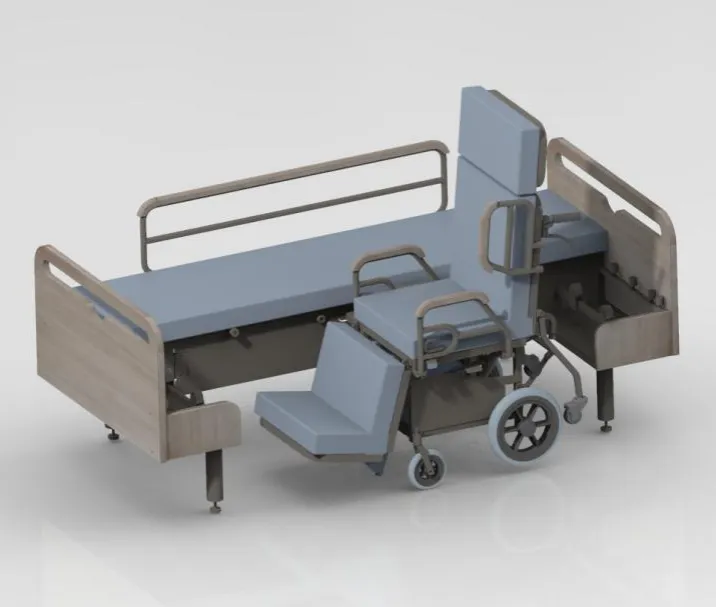
Is There a Cure for Alzheimer's?
Unfortunately, there is currently no cure for Alzheimer's. Despite scientists' tremendous efforts to find a cure, there is still no treatment that can completely reverse or stop the progression of this disease. Existing treatments focus on alleviating symptoms, improving patients' quality of life, and slowing the progression of the disease.
Drug treatment
There are several classes of drugs that can help slow the symptoms of Alzheimer's disease. These drugs include cholinesterase inhibitors (such as donepezil, galantamine, and rivastigmine) and NMDA receptor antagonists (such as memantine). These drugs can improve communication between neurons, thereby temporarily alleviating the decline in memory and cognitive function.
Non-drug treatment
In addition to drug treatment, non-drug treatments also play an important role in the management of Alzheimer's disease. Cognitive behavioral therapy, music therapy, art therapy, etc. have all been shown to have a certain effect on improving patients' mood and behavior. In addition, maintaining social activities, doing moderate physical exercise, and maintaining a regular schedule are also beneficial to the overall health of patients.
Nursing support
Due to the increasing care needs of patients with Alzheimer's disease, home care and professional care have become essential. Providing appropriate nursing support can help patients maintain basic functions of daily life and extend their independence as long as possible.
Why do patients with Alzheimer's disease need a hospital bed?
Alzheimer's patients face multiple challenges at all stages of the disease, especially as physical functions gradually deteriorate and cognitive abilities decline. Hospital beds play a vital role in this process, helping patients get better care and management at home or in a nursing facility.
Comfort
As Alzheimer's progresses, it may become increasingly difficult for patients to find a comfortable position in a regular bed. The versatile adjustment capabilities of hospital beds allow patients to find the sleeping and resting position that best suits them by adjusting the height of the bed, the angle of the head and the foot.
Safety
Since Alzheimer's patients often show signs of restlessness at night, difficulty turning over, or the risk of falling, the safety rails of hospital beds can prevent patients from falling while sleeping or unconscious, providing additional protection. In addition, the height adjustment function of the bed can help caregivers more easily perform daily care for patients, such as turning over, bathing, or changing bed sheets, reducing the risk of accidents during care.
Functional Support
Alzheimer's patients may need to receive various medical care or rehabilitation treatments on a regular basis. Hospital beds can provide patients with a safe and comfortable environment to perform these care operations. Whether it is injecting medication, performing physical therapy, or performing other medical procedures, hospital beds can provide the necessary support to ensure the smooth progress of the care process.
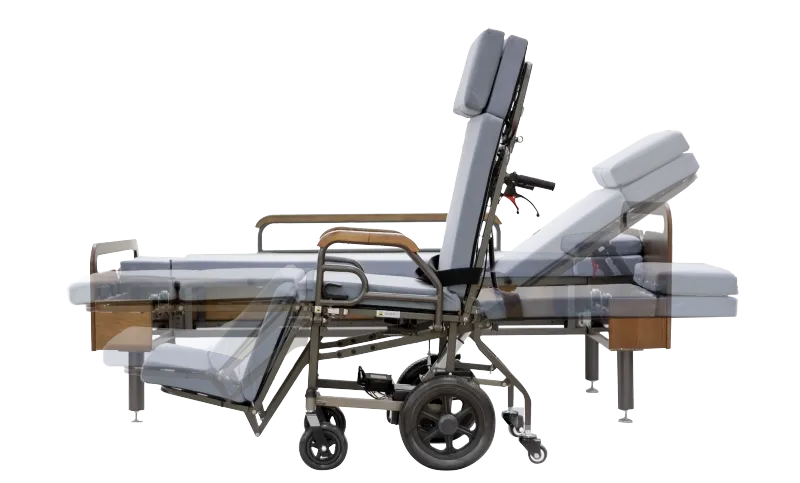
How do hospital beds help treat Alzheimer's?
Although hospital beds cannot directly treat Alzheimer's, they play an irreplaceable role in improving the quality of life of patients and reducing symptoms. Here are a few specific ways that hospital beds can help treat and manage Alzheimer's patients:
Improve sleep quality
Alzheimer's patients often face sleep disorders such as insomnia and frequent night awakenings. The adjustable function of hospital beds allows patients to find the most comfortable sleeping position, thereby reducing the number of night awakenings and helping patients get higher quality sleep. Adequate sleep plays an important role in reducing daytime anxiety and confusion and improving overall cognitive function.
Provide daily care convenience
The electric adjustment function of hospital beds makes it easier for caregivers to provide care for patients. This not only reduces the physical burden on caregivers, but also makes patients more comfortable when receiving care. For example, caregivers can adjust the height of the bed to facilitate patients to eat, dress or receive treatment, thereby improving care efficiency.
Reduce the risk of complications
Alzheimer's patients who are bedridden for a long time are prone to complications such as pressure sores and pneumonia. The pressure distribution function and posture adjustment capabilities of hospital beds can help prevent these complications. In addition, the tilt angle adjustment function of the bed can help patients reduce the risk of choking when eating or drinking, thereby reducing the incidence of aspiration pneumonia.
Support emotional and psychological health
Alzheimer's patients' emotional and psychological health also need attention. The comfort and safety of hospital beds allow patients to better cope with the anxiety and restlessness caused by the disease. By providing patients with a safe and comfortable environment, their mood swings and behavioral problems may be alleviated to a certain extent.
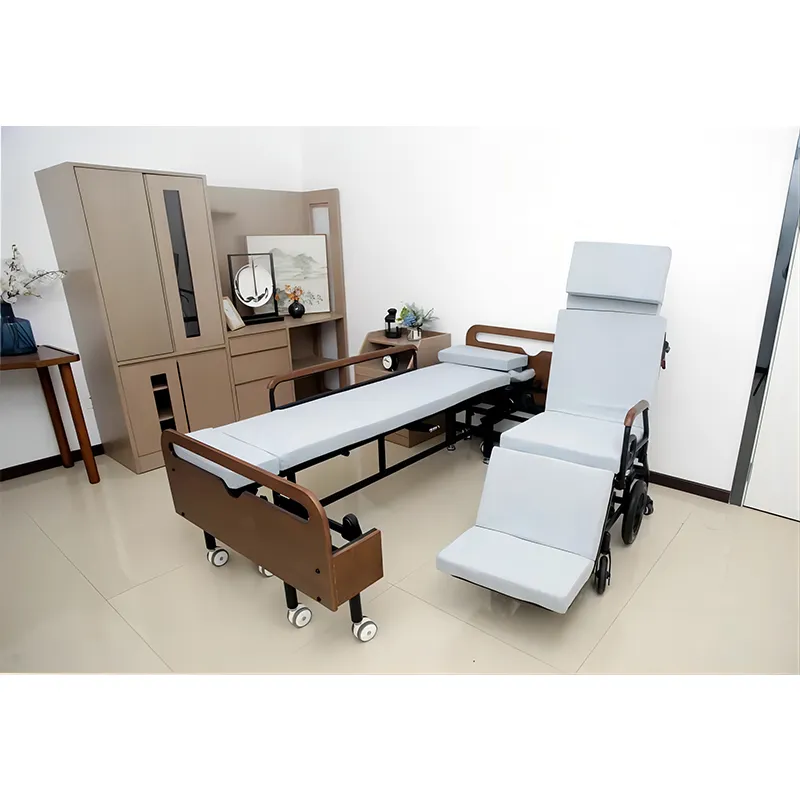
How can hospital beds help manage nighttime problems for patients with Alzheimer's?
Alzheimer's patients often face many problems at night, including insomnia, night awakenings, confusion and disorientation. Hospital beds can provide significant help in these areas:
Reduce night awakenings
The adjustment function of hospital beds allows patients to find the sleeping position that suits them best, reducing night awakenings due to discomfort. For example, by adjusting the angle of the head and feet, patients can be helped to find a more comfortable position so that they can fall asleep in a more relaxed state and wake up less due to discomfort.
Relieve confusion and disorientation
For patients with Alzheimer's, confusion and disorientation at night are common problems. Safety rails and bedside position lights equipped with hospital beds can help patients stay safe at night and prevent them from falling or getting lost. The height adjustment function of the bed also makes it easier for caregivers to reach patients when caring for them at night, avoiding the trouble caused by the bed being too high or too low.
Improve night care
The adjustable function of hospital beds can greatly simplify night care operations. Caregivers can adjust the height of the bed to facilitate examinations or changing sheets on patients without having to bend over or move the patient, thereby reducing discomfort during care. At the same time, adjusting the tilt angle of the bed can also help patients maintain the correct posture when taking medication or eating, reducing the risk of choking.
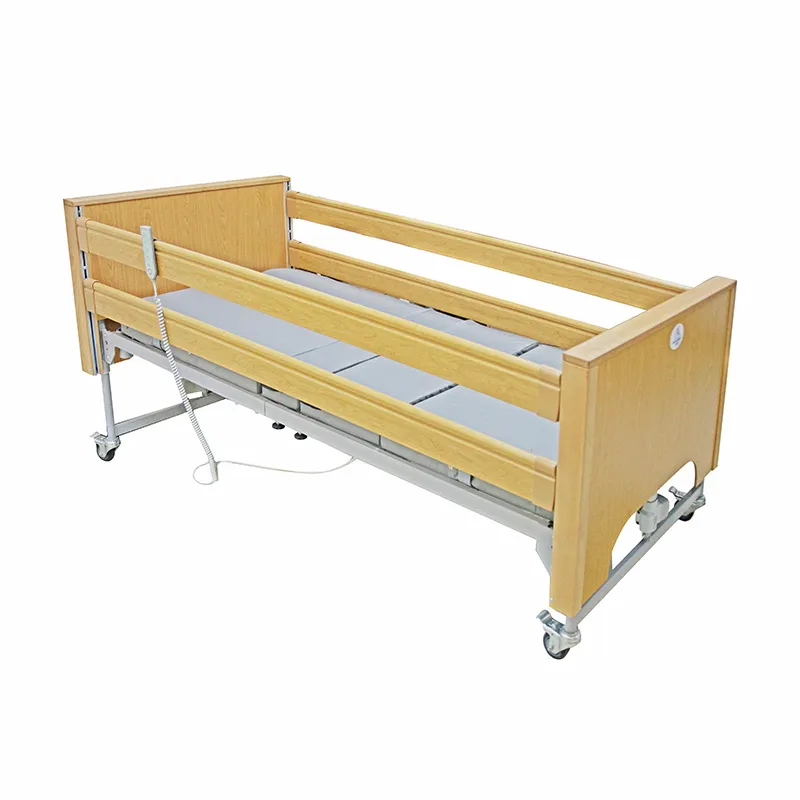
Why is it important to switch to hospital beds as early as possible for progressive diseases such as Alzheimer's?
Alzheimer's is a progressive disease that gets worse over time. Early conversion to a hospital bed can help provide better care at all stages of the disease, thereby improving the quality of life and care experience of patients. Here are some important reasons to switch to a hospital bed early:
Improve quality of life
Hospital beds provide greater comfort and functional support, which can improve the quality of daily life of patients, especially those who already have cognitive and physical dysfunction. Early conversion to a hospital bed can help patients find the right sleeping and resting posture, thereby reducing physical discomfort caused by the progression of the disease.
Prevent complications
Alzheimer's patients are prone to complications such as pressure sores and pneumonia due to long-term bed rest. The pressure distribution function and posture adjustment ability of hospital beds can help prevent these complications, and early conversion to hospital beds can effectively reduce these health risks.
Improve nursing efficiency
Caregivers often need to deal with various challenges when caring for patients with Alzheimer's. The adjustment function and safety design of hospital beds can greatly improve nursing efficiency and reduce the physical burden during the care process. By switching to a hospital bed early, caregivers can more easily provide the necessary care for patients, thereby improving the quality of care.
Adapting to changing conditions
Alzheimer's disease changes gradually, and as the disease progresses, the patient's needs and care requirements will continue to change. The versatile and adjustable features of hospital beds can help patients and caregivers adjust the bed settings at any time to adapt to changes in the disease and the patient's specific needs. This flexibility is particularly important at all stages of the disease.








